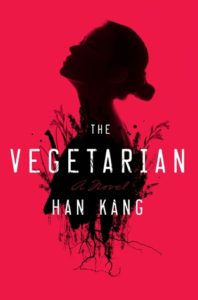 I usually have good luck with Man-Booker Prize-winners, but not this time. The Vegetarian is a story of a woman who goes insane. At the current time, medical science does not, for the most part, understand insanity, its causes or cures. So to have a character “go” insane is simply to abrogate one’s responsibility as a writer to provide proper motivation. Hey, she went insane – no explanation needed for her behavior, no matter how weird or erratic. To me, that’s a wobbly crutch for any writer, almost as bad as “…it was all just a dream after all.”
I usually have good luck with Man-Booker Prize-winners, but not this time. The Vegetarian is a story of a woman who goes insane. At the current time, medical science does not, for the most part, understand insanity, its causes or cures. So to have a character “go” insane is simply to abrogate one’s responsibility as a writer to provide proper motivation. Hey, she went insane – no explanation needed for her behavior, no matter how weird or erratic. To me, that’s a wobbly crutch for any writer, almost as bad as “…it was all just a dream after all.”
Another point of irritation for me is the mischaracterization of vegetarianism, if it can be called an “-ism”. As a lifelong practitioner, I do have some insight into that diet and first of all, it is not any kind of self-deprivation, asceticism, or self-denial. Plant food is rich and abundant and healthier to eat than any meat, fish or poultry. Secondly, the moral implications of eating meat can be serious concerns, depending on what you think of your fellow animals and how they should be treated. Finally, the idea that a vegetarian diet will make you weak, in body or mind, is simply absurd, as is the idea that it is in any way related to anorexia nervosa. All these myths are proffered in this book and I was put off by the perpetuation of such superstitious folklore.
The woman who “goes” vegetarian does so suddenly, and for no reason except perhaps the stimulus of a dream, which, as much of it as is tediously presented, seems to have nothing to do with diet. So this is the same thing as saying the triggering act that drives the whole novel, her becoming vegetarian, is without motivation. That cannot lead to a strong story.
A more subtle reader might discern that her dreams might be about childhood sexual abuse, so “eating meat” might have symbolic meaning to her as she attempts to somatize her unacknowledged inner distress. That is a generous reading, hinted at but not obvious in the text.
I am interested in Korean society and tracked how the people around her reacted to her non-decision to forego eating meat. Essentially, they react violently against her, and it is a reaction against her nonconformity as much as anything else. That is the author’s representation of the way women are regarded in that society, by both men and women, and that part of the story was interesting.
The story has three parts, each told from a different point of view. The first is told by the woman’s husband and he relates his confusion and dissatisfaction and finally anger at his wife’s behavior. The second part is told by her brother-in-law, who inexplicably and suddenly desires her sexually after being told she has a birthmark on her butt. The reaction and consequent behavior is again utterly unmotivated. Nevertheless, he pursues her, and her passive reaction is as horrifying as his unthinking predation.
The final section is told by the woman’s sister as she attempts to care for her in the hospital, but ultimately succumbs to some sort of unspecified depression, as if mental illness were contagious.
It all adds up to nothing because none of the characters is motivated, nearly all their actions arbitrary. That is a recipe for a failed story, which this is. The writing is lovely in places, and there are many haunting images, such as the two painted bodies having sex. Nevertheless without story or character development, even a collection of striking images is pointless. Apparently however, that is enough to constitute a novel these days, at least for the Man-Booker judges, but not for me.
Kang, Han (2007/2016). The Vegetarian. New York: Hogarth/Crown/Penguin/Random, 188 pp.
